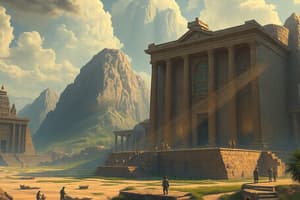Podcast
Questions and Answers
The Mesozoic Era is also known as the Age of Mammals.
The Mesozoic Era is also known as the Age of Mammals.
False (B)
The Paleozoic, Mesozoic, and Cenozoic eras are divisions of the prehistoric era.
The Paleozoic, Mesozoic, and Cenozoic eras are divisions of the prehistoric era.
True (A)
The Sumerians, Egypt, and the Indus Valley Civilization are ancient civilizations that predate recorded history.
The Sumerians, Egypt, and the Indus Valley Civilization are ancient civilizations that predate recorded history.
True (A)
The Medieval Period is also known as the Middle Ages.
The Medieval Period is also known as the Middle Ages.
Feudalism declined during the Medieval Period.
Feudalism declined during the Medieval Period.
The Renaissance was a time of cultural decline and regression.
The Renaissance was a time of cultural decline and regression.
Christopher Columbus and Vasco da Gama were seafarers who lived in the 15th to 17th centuries.
Christopher Columbus and Vasco da Gama were seafarers who lived in the 15th to 17th centuries.
The Industrial Revolution took place in the 17th century.
The Industrial Revolution took place in the 17th century.
The League of Nations was established after the Second World War.
The League of Nations was established after the Second World War.
The Cold War was a significant event in modern history.
The Cold War was a significant event in modern history.
Decolonization mostly occurred in the early 20th century.
Decolonization mostly occurred in the early 20th century.
The collapse of four major empires happened after the Second World War.
The collapse of four major empires happened after the Second World War.
Flashcards are hidden until you start studying
Study Notes
General Knowledge: Exploring the Past
General knowledge is a treasure trove of facts and information spanning various domains of human curiosity. In this exploration, we'll delve into the subtopic of history, a powerful tool to understand the past and shape our present.
Prehistoric Eras
The history of the world stretches back over 3.5 billion years, with the earliest traces of life in Earth's oceans. The prehistoric era is divided into several epochs, such as the Paleozoic, Mesozoic, and Cenozoic eras. The Mesozoic Era, commonly known as the Age of Reptiles, saw the rise and fall of the dinosaurs and is a pivotal time in Earth's history.
Ancient Civilizations
The ancient world teeming with diverse civilizations serves as a backdrop to much of human history. Civilizations like the Sumerians, Egypt, and the Indus Valley Civilization predate recorded history, but their artifacts, architecture, and remnants continue to fascinate us. The rise of the first empires, such as the Babylonians, Persians, and the classical civilizations of Greece and Rome, shaped the course of history for centuries to come.
Medieval Period
The Middle Ages, or the Medieval Period, encompassed the years from 500 to 1500 CE. This period was marked by the decline of the Western Roman Empire and the ascension of feudalism. During this time, Christianity flourished, and the Renaissance, a time of cultural rebirth and revival, began to take shape.
The Age of Exploration
From the 15th to the 17th centuries, Europeans embarked on an era of exploration and discovery. Seafarers like Christopher Columbus and Vasco da Gama traveled the globe, charting new territories and facilitating the exchange of goods, ideas, and cultures across the globe.
The Enlightenment and Industrial Revolution
The 18th century gave birth to the Enlightenment, an intellectual movement characterized by the pursuit of knowledge and the advancement of rational thought. This period paved the way for the Industrial Revolution, which transformed the world through the development of machinery and new manufacturing processes, leading to unprecedented economic growth, urbanization, and technological advancements.
World Wars and Decolonization
The 20th century was shaped by two world wars, numerous conflicts, and the decolonization of the world. The First World War, which began in 1914, led to the collapse of four major empires and the rise of the League of Nations, an early predecessor to the United Nations. The Second World War, which began in the 1930s, saw the rise of totalitarian regimes and the development of nuclear weapons, ultimately ending in the defeat of Germany, Japan, and the dismantling of the Axis Powers.
The 20th century also witnessed the end of colonial rule in most of the world, as nations gained independence and embarked on their own paths to development.
Modern History
Modern history encompasses the post-World War II era, characterized by the rise of the United States and the Soviet Union as global superpowers, the development of new technologies, and the expansion of global trade. Events such as the Cold War, the end of Apartheid, and the fall of the Berlin Wall have all left indelible marks on the world we live in today.
In Conclusion
The history of our world is a complex tapestry, woven with countless threads of events, cultures, and ideas. By exploring the past, we gain insight into who we are and where we come from, and we begin to appreciate the incredible journey that has brought us to the present day. General knowledge, then, is not merely a collection of facts; it is a way of understanding the fundamental forces that shape our world and our human experience.
Studying That Suits You
Use AI to generate personalized quizzes and flashcards to suit your learning preferences.




